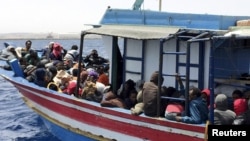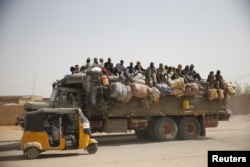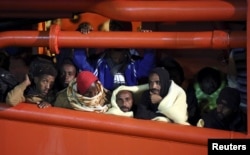A number of recent reports suggest that the Islamic State is not only making millions trafficking humans out of Libya, but smuggling its own fighters on boats headed across the Mediterranean to Europe. These reports have given added urgency to European Union ambitions to disrupt human smugglers and stem the flow of migrants into Europe — and to requests by the Libyan government for support.
Libya’s appeal
The fall of Moammar Gadhafi in 2011 brought about a resurgence of Islamic militant groups in Libya, many of whom were marginalized under Gadhafi’s rule.
As the so-called Islamic State gained international attention through military successes in Iraq and Syria and savvy propaganda distributed on social media, some of those Libyan groups declared loyalty to ISIS.
Last January, an IS supporter in Libya published a blog post titled, Libya: The Strategic Gateway for the Islamic State, later translated by the London-based Quilliam Foundation.
The writer argued that because of Libya’s strategic location, majority-Sunni population and significant stockpiles of weapons, it was an ideal base for IS operations against “the Crusader coalition” – i.e., the West.
He cited Libya’s long coastline and vicinity to Europe, “which can be reached with ease by even a rudimentary boat.”
“According to many, it is easily possible to pass through Maritime Security Checkpoints and arrive in cities. If this was even partially exploited and developed strategically, pandemonium could be wrought in the southern Europe,” he wrote.
It is almost impossible to gauge the numbers of IS fighters in Libya. Reports are largely anecdotal, and analysts caution against inflating the numbers.
“It’s really important to recognize that there are agendas at work here, and we must be rational in dealing with them,” warned Charlie Winter, the researcher at the London-based Quilliam Foundation who translated the “Gateway” blog post.
It’s also not clear whether the atrocities committed by Libyan groups professing allegiance to IS – like beheadings of Egyptian workers and an attack on a Tripoli hotel – were orchestrated by IS’s central leadership or if the Libyan groups are acting under their own direction.
Money to be made
Meanwhile, more than a 250,000 migrants crossed the Mediterranean last year in flimsy boats looking for a better life in Europe.
Coming from Syria and Africa, they pay militants and tribal groups to navigate them across the Sinai or the Sahel to Libya. There, they hire human smugglers to ferry them to Europe in flimsy boats.
The “fares” are exorbitant—anywhere from $800 to $2,500 or more. As many as 2,000 migrants have drowned in the Mediterranean this year—800 in a single disaster in April.
The Islamic State in Syria and Iraq has made millions of dollars off the black market in oil, antiquities and humans; money laundering; “taxation” and other forms of extortion. If there is money to be made in human smuggling out of Libya, it’s not surprising that IS would want “in” on the action.
“I think there probably is evidence to suggest that this is happening,” said Winter, who translated the “Gateway” blog post.
“IS functions like a criminal gang in the areas that it controls. So of course wherever there is business and enterprise, the group will try to take a cut of that," he said.
Recently, Abdul Basit Haroun told BBC Radio Five that while IS doesn’t govern smuggling operations in Libya, it taxes smugglers 50% of every fare they collect. And that amounts to a lot of money.
According to Haroun, IS sends its own operatives along for the boat trip to Europe.
"The boat owners have a list of who to take but some people come suddenly and they're told, 'take them with you,'" said Haroun.
“…the European police don't know who is from IS and who is a normal refugee or not,” he said.
But it is unclear in what capacity Haroun was commenting; media have alternately described him as a “warlord,” a Benghazi security chief and a gun smuggler.
Winter says such reports should be greeted with some skepticism.
“Just as we have to take reports from the other side of it, from the jihadist side of it, with a pinch of salt,” he said. “If we start taking everything that is said as sacrosanct, that could lead us down a very dangerous route.”
He believes there is reason to be concerned about IS, but that concern is best focused on the countries in which it has a territorial presence.
“The Islamic State’s key emphasis right now – its strategic priority – is on consolidation. It doesn’t seem to be on exportation,” he said.
In other words, in the short term, IS is busy expanding its caliphate.
EU steps up anti-smuggling efforts
The European Union has approved a controversial plan to disrupt human smugglers operating in the southern central Mediterranean.
“I think the EU’s plan is to stop boats that have just left the Libyan coast or just perhaps leaving the Libyan coast and then expect the smugglers to surrender or run away, and then they will destroy the boat,” Steve Peers, Professor of European Union and Human Rights Law at the University of Essex.
Libya’s Ambassador to the United Nations Ibrahim Dabbashi initially rejected the plan as “worrying,” but Wafa Bugaighis, Libya’s charge d’affaires in Washington, said her government has appointed a special envoy to discuss the plan with European officials.
“We believe in an increased presence of EU naval forces off Libyan waters to prevent illegal immigration and prevent smugglers of humans or other kinds of smuggling, whether oil, drugs or arms,” she said. “But any further action in Libyan water or on Libyan soil is very sensitive.”
While officials said the migrants’ safety and disrupting human trafficking were the chief motives for the plan, NATO Secretary-General Jens Stoltenberg acknowledged that worries over extremist groups using the migrants as cover to infiltrate Europe was a concern.
“One of the problems also is that there might be foreign fighters, there might be terrorists trying to hide, trying to blend in among the migrants,” he said Monday.
“And this underlines the importance that we have to respond to this turmoil.”
Speaking on behalf of her government, Bugaighis said that the best way Europe and the United States can combat extremism and related criminal activity would be to support the region’s struggling democracies.
“I believe that the international community should support peace and stability in Libya – not just for the sake of Libya, but for the sake of the region of southern Europe, of the Sahel and Sahara, of all our neighboring countries.”












